Managing employee resignations while protecting your company can be challenging. Garden leave helps safeguard sensitive information and maintain client relationships during this transition.
Garden leave occurs when an employee is instructed to stay away from work while still receiving pay and benefits. They cannot access company systems, interact with clients, or perform job duties. This in turn reduces risks like data breaches.
Originally from the UK, this leave is now widely used to ensure smoother transitions. Employees benefit from financial security and time to plan their next career move.
This guide covers the meaning, benefits, and legal implications of garden leave for HR professionals and employees managing employment transitions.
What is garden leave?
Garden leave is a period during which an employee who has resigned or been terminated is instructed not to work but continues to receive full pay and employee benefits.
It aims to protect the company’s confidential information, prevent client poaching, and restrict access to sensitive systems while ensuring a smoother transition for both parties.
Why do employers use garden leave?
- For Prevention of information leaks
- Client relationship management
- Competitor safeguard
When does garden leave apply?
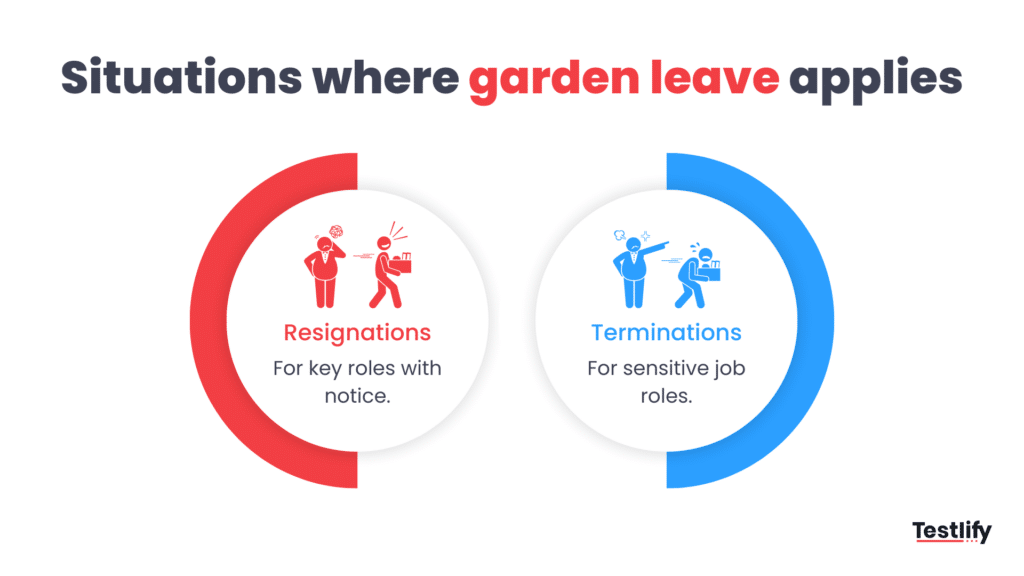
- Resignations with notice – When an employee voluntarily resigns but holds critical company knowledge.
- Terminations – When employers terminate employees in sensitive roles.
Garden leave serves as a strategic measure for employers to mitigate potential business risks while ensuring employees receive financial stability.
How does garden leave work?
When an employer enforces leave, the employee is instructed not to report to work during their notice period but continues to receive their regular salary and benefits. This period typically lasts until the employee’s official termination date. Below are some key elements of how garden leave works,
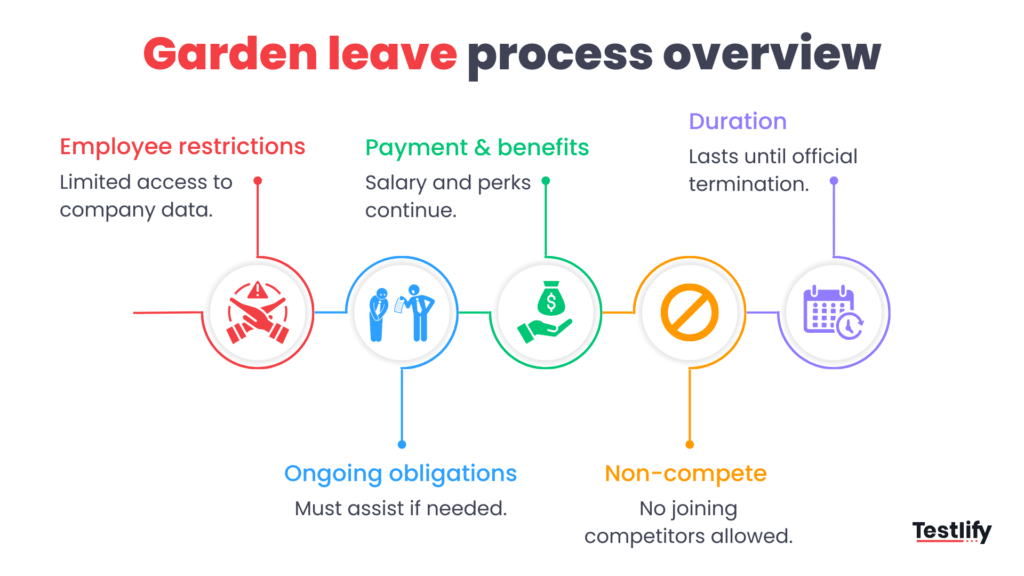
Employee restrictions
The employee is restricted from accessing company resources, communicating with clients, and sharing sensitive company information. These restrictions minimize potential harm to the company’s competitive position and safeguard critical business data.
Ongoing obligations
While on garden leave, the employee must remain available to assist the company if required, such as providing handovers, answering critical questions, or completing unfinished tasks. This ensures continuity and reduces operational disruptions.
Payment and benefits
The employer must continue to provide the employee’s salary, health insurance, and other contractual benefits during this time. This financial stability supports the employee while ensuring they remain contractually bound.
Non-compete enforcement
This leave often overlaps with non-compete clauses. This in turn prevents employees from joining competitors while still on the company payroll. This overlap strengthens the company’s ability to protect proprietary information and maintain market competitiveness.
Duration and termination date
The length of the leave is typically specified in the employment contract and may vary depending on the role and industry. The period usually extends until the employee’s official termination date, ensuring sufficient time for knowledge transfer and business adjustments.
Garden leave ensures a balance between business protection and employee welfare. This creates a structured transition period for both parties.
Garden leave vs notice period
While garden leave and notice periods are related, they fulfill different roles in employment transitions. A notice period is the time between an employee’s resignation or termination and their final working day.
In contrast, garden leave involves the employee staying away from the workplace while still receiving pay and benefits.
| Notice Period | Garden Leave |
| Employee continues working as usual | Employee is relieved from work duties |
| Full access to company systems and clients | No access to company resources or clients |
| Moderate protection from sensitive exposure | Strong protection through restricted access |
| Salary and benefits continue during notice | Salary and benefits continue with restrictions |
Understanding these differences helps businesses decide whether to apply garden leave or rely on a standard notice period. This ensures both operational continuity and legal compliance.
Benefits of garden leave
Garden leave provides several advantages for both employers and employees which makes it a strategic approach in managing employment transitions.
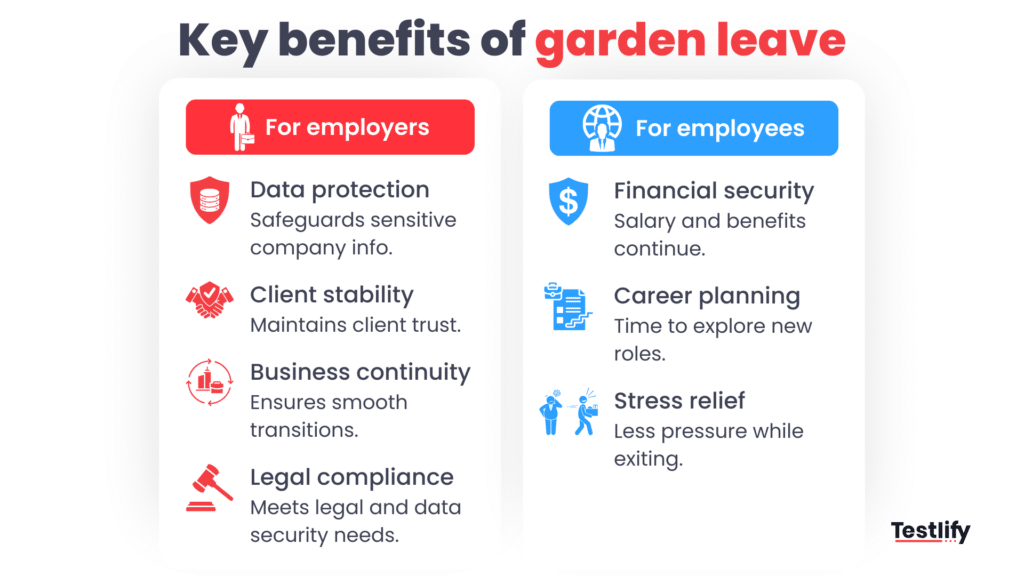
For employers
- Protecting sensitive information: Prevents departing employees from accessing company property or sharing confidential data.
- Client relationship management: Maintains stability in relationships with clients by reducing the impact of sudden staff departures.
- Business continuity: Ensures smoother transitions by minimizing disruptions when key employees leave.
- Legal and compliance security: Helps companies comply with employment laws while safeguarding proprietary information.
For employees
- Financial stability: Employees continue to receive their salary and benefits during the leave period.
- Career planning time: Provides a period of time to explore new job opportunities or pursue personal goals.
- Reduced workplace stress: Eliminates the pressure of working while navigating the complexities of leaving a company.
Balancing both parties’ interests makes garden leave a mutually beneficial arrangement supporting career transitions and legal protections.
Legal considerations
Employers must adhere to legal requirements when implementing garden leave to avoid potential disputes or legal challenges. Below are some key legal aspects to consider.
1. Employment contracts
The employment contract should include a well-defined leave clause outlining the terms, duration, and obligations. Both parties must mutually agree to these terms, making the arrangement legally enforceable.
2. Compliance with labor laws
Labor laws vary by country, so businesses must comply with local employment regulations. Employers must also fulfill any statutory notice period obligations to avoid legal repercussions.
3. Employee rights protection
Employees on garden leave should receive their regular pay and benefits as stipulated in their contract, while employers must ensure fair treatment by avoiding discrimination or any form of unfair practices during the leave period.
4. Dispute resolution
Include a dispute resolution process to handle potential conflicts regarding leave terms. Prepare for possible litigation if employees challenge the enforceability of the leave clause.
Addressing these legal considerations enables businesses to implement garden leave effectively, minimizing potential legal risks and ensuring fair treatment for all parties involved.
Potential drawbacks and challenges
For employers
Financially, garden leave can be burdensome as employers must continue paying salaries and providing benefits without receiving active contributions from the employee. This additional expense can particularly strain smaller businesses with limited budgets.
Operational disruptions are another significant concern. When key roles remain vacant during the garden leave period, businesses may face productivity declines due to delayed project timelines or increased workloads for remaining staff. Employers must also invest extra time and resources in hiring and onboarding replacements.
Legal complexities may arise due to unclear contract terms. If the garden leave clause lacks specificity regarding the employee’s obligations or allowable activities during the leave, disputes may occur. This can result in costly legal battles if the interpretation or enforceability of the clause is challenged.
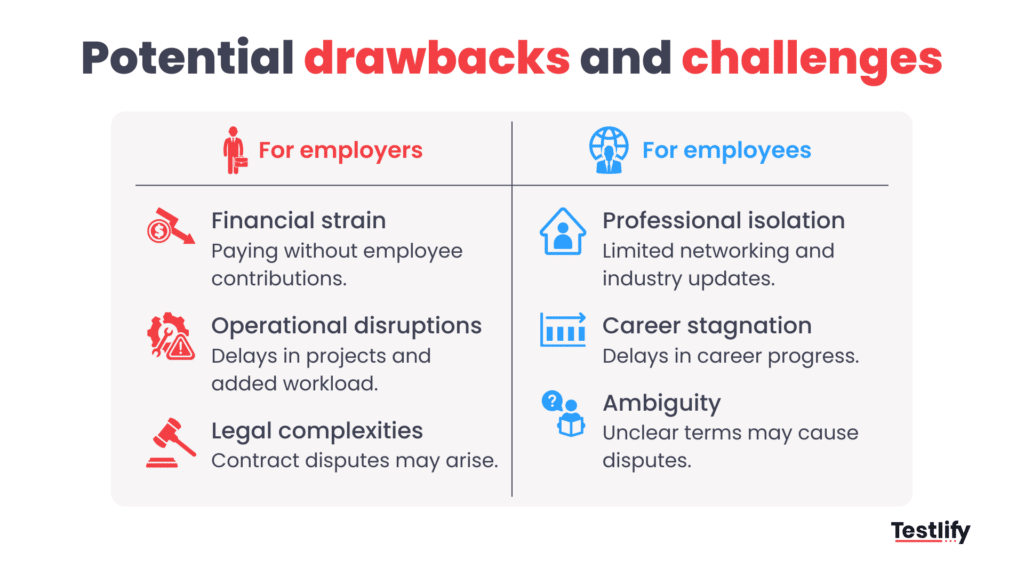
For employees
For employees, professional isolation is a common drawback. Being disconnected from daily workplace activities can limit access to industry updates, reduce professional networking opportunities, and slow career progression.
Additionally, career advancement may stall during the garden leave period as employees remain bound by contractual obligations. This delay can hinder timely career transitions and limit future job prospects.
Ambiguity in gardening leave terms can also affect employees negatively. If responsibilities, entitlements, and permissible activities are not clearly defined, misunderstandings may occur. This creates legal disputes and uncertainty about future employment opportunities.
Addressing these potential challenges requires employers to adopt transparent policies, ensure legally sound contracts, and maintain open communication with employees to balance business needs and employee rights effectively.
Does garden leave affect company culture?
Garden leave can shape company culture depending on how it is communicated and managed. Clear explanations about its purpose and the departure process are essential for maintaining a positive workplace environment.
Explore More: How to create a positive work culture?
Unexplained placements on gardening leave may cause uncertainty and lower morale. Remaining staff could question job stability or feel disconnected due to sudden team changes. This develops mistrust and reduces engagement.
Poorly managed gardening leaves can create a culture of secrecy. Employees might view it as punitive, harming the company’s reputation as a supportive employer.
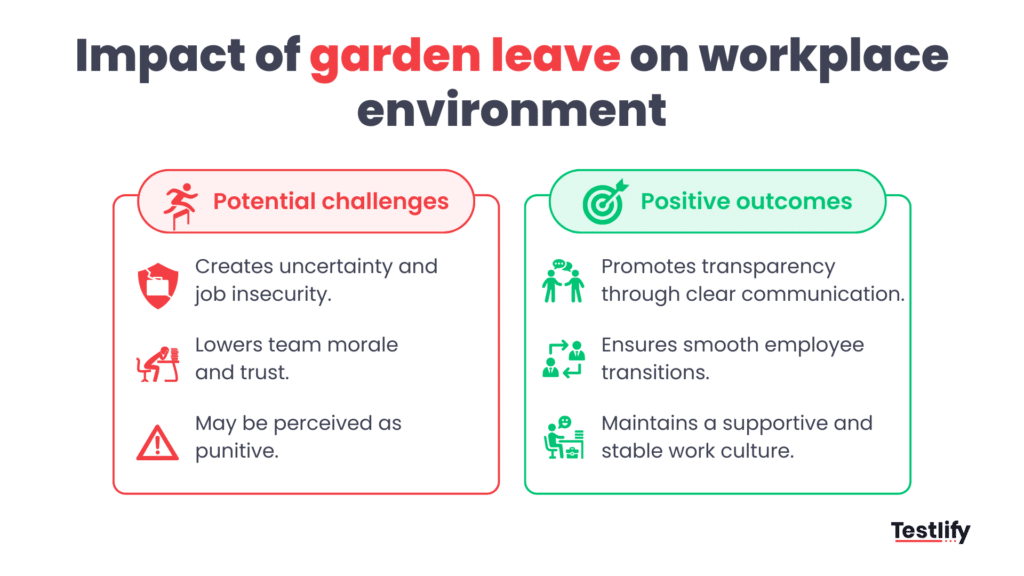
However, transparent management can strengthen company culture. Explaining garden leave as a protective business measure while emphasizing fairness can reassure staff. This approach highlights the company’s commitment to stability and respectful employee transitions.
To prevent negative cultural impacts, employers should adopt clear policies, provide regular updates, and maintain a supportive environment. This ensures that supportive serves as a strategic business tool rather than a source of tension.
Final thoughts
Garden leave, when used strategically, balances business protection and employee welfare. Its financial, operational, and legal challenges can be addressed through clear communication, well-defined policies, and legally sound contracts.
Employers can safeguard sensitive information, maintain client relationships, and ensure smooth transitions. Employees benefit from financial security and career planning time. Transparent and fair implementation builds trust and stability within the organization.
More than just a contractual clause, garden leave is a strategic business approach that supports both company interests and employee transitions. Effective management ensures it remains a valuable practice, not a source of conflict or mistrust.










